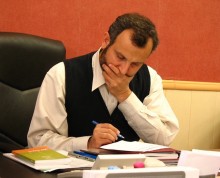Experience in the garden teaches us that the strongest of plants cannot flourish if the soil is poor.
The wise gardener tends to his soil carefully, in order to prepare the necessary environment in which plants can thrive and bear fruit.
By analogy, the same is true in evangelization. When a Catholic organization—be it a diocese, parish, movement, or other apostolic entity—has issues located in its “soil” such as isolated or overwhelmed leaders, divisions, system-wide confusion, or little joy, then its “plants”—programs, plans, and people—cannot flourish. Efforts that might otherwise have produced missionary disciples get frustrated; and good, devout, and talented people can be left puzzled and deflated.
This article aims to examine one foundational factor required for organizational health: the existence of a real, and healthy, leadership team. Assuming that the organization and its leadership are sufficiently rooted in grace and prayer, such that the supernatural dimension is sufficiently tended to, on the natural level it is impossible to flourish without such a team. Patrick Lencioni, in his book The Advantage, defines a leadership team as a “small group of people who are collectively responsible for achieving a common objective for their organization.” The idea here is that nothing substantial and lasting can be accomplished by lone rangers. We need look no further than Jesus. The eternal Son of God didn’t do work alone to save us and establish the Church, but chose to work with a team: twelve apostles whom he recruited, formed, led, and to whom he entrusted real responsibility. Shouldn’t we do likewise?
To be clear, I suspect it’s the rare Catholic leader who wants or tries to be a lone ranger. Many simply end up doing so because they haven’t seen a better way to do things. Regarding priests, for example, seminary formation is jam packed with the required intellectual, spiritual, pastoral, and human formation. In our archdiocese, furthermore, the seminarians I work with live and study at a Benedictive monastery, and thus there are additional (good) demands on their time having to do with community responsibilities. Thus, finding time for formation in organizational leadership is very difficult. Finally many Catholic organizations have committees, boards, and councils that seek to help, but there’s a very good chance that they aren’t intended to be, or functioning as real leadership teams.
Let me provide two common examples from the parish context, starting with the pastoral council. Depending on how it’s structured, this body may offer advice to the pastor or report from different leaders on activities in the parish. This is good, but if it’s left to the pastor alone to deliberate and act on the advice or reports, this can be problematic. I work with pastors who would candidly concede that they get overwhelmed: they leave council meetings with more “to do” items than when they entered. Being overwhelmed undermines joy, peace, and one’s ability to make decisions.
As another example, let’s say a pastor has dedicated and talented people assisting him as staff and volunteers. This, too, is good. If, however, these leaders are too numerous and report to him directly and not to a team of delegates, then again we have a problem—like a young priest I know whose email inbox contains 4,600 unread messages (that’s not a typo). This is indicative of what I refer to as the "under-delegated life."
So how might this affect lay leaders? First, if a pastor isn’t entrusting real responsibility and work to a team and is doing too much on his own, one result is that he may be very difficult to access. Thus, leaders of various ministries may be held up in their work as they seek approval and direction from a leader they cannot contact consistently. This can be compounded if his circumstances are making it more difficult for him to make decisions in a timely manner.
Without a cohesive team providing clarity and direction for the whole parish, it’s also common that parishes are suffering from the “silo” effect: otherwise well-intentioned people doing good work but sometimes pulling in different directions, due to a lack of communication and coordination among committees, personnel, and volunteers. This results in unpleasant conflicts and confusion regarding things like prioritizing, budget allocation, room use, and the pastor’s attention. Ultimately, these things can only be solved by a cohesive parish leadership team, working under and with the pastor, providing clear direction and communication to everyone involved.
One final—and perhaps the most significant—effect of the absence of a team regards the witness of parish leadership. We know that peace and joy are attractive. When leaders are overwhelmed and isolated, these fruits of the Spirit are obscured. We know that people respond to genuinely happy people more readily than to posters and carefully crafted presentations.
In conclusion, evangelization can only flourish if ordained and lay leaders discover the wisdom of working with well-formed, healthy leadership teams. On the natural level, this is the root antidote to so much of what hinders and ails the Church’s mission. Come, Holy Spirit.
This article was originally published in The Catechetical Review (Vol. 2 No. 4, Oct-Dec 2016), page 25. It has been adapted and reprinted here with permission from the publisher, Franciscan University of Steubenville. This article and others by Kyle Neilson may also be found online at Catechetics.com.















